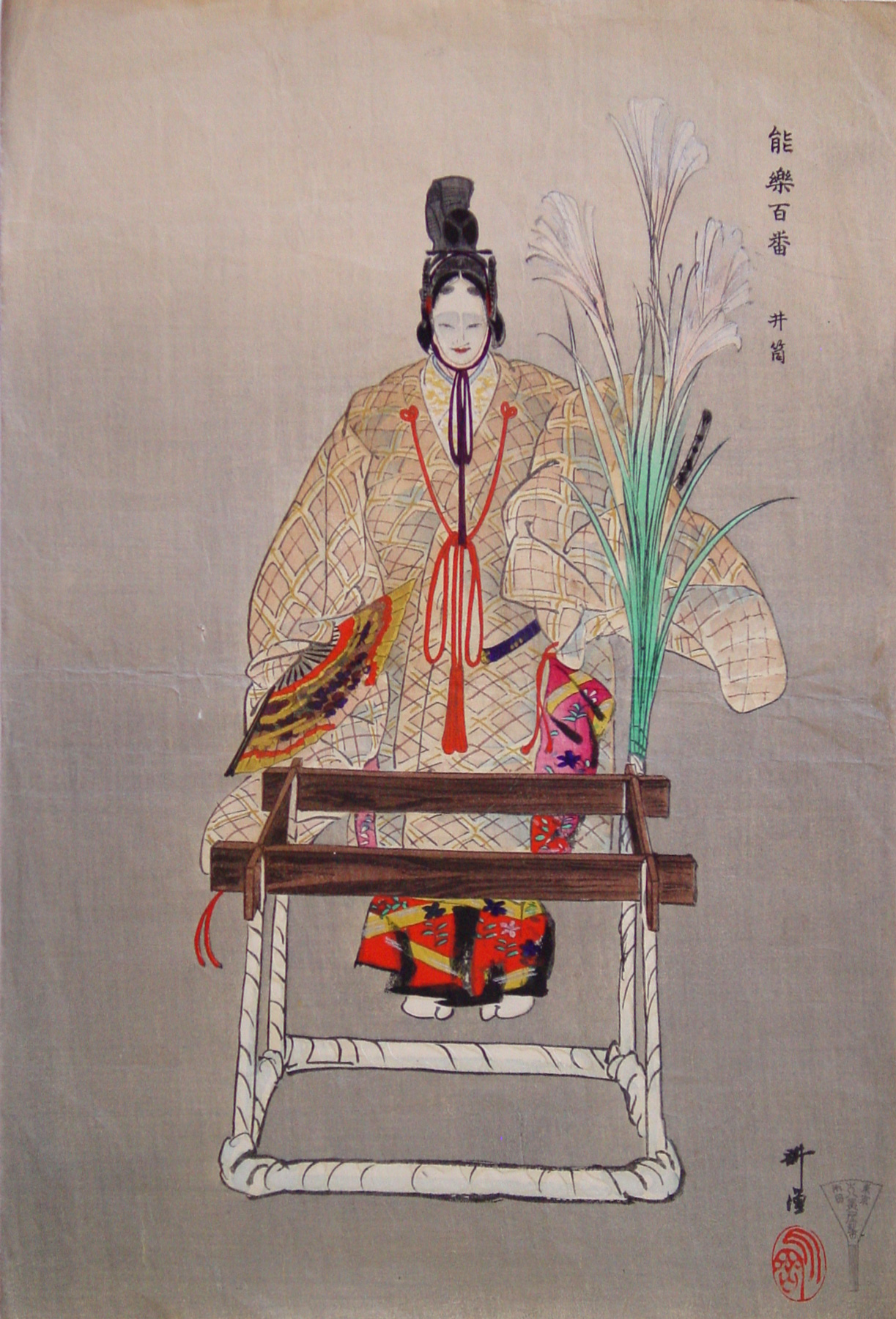About This Print
One of 120 prints issued as part of the series Nōgaku hyakuban (One Hundred Prints of Noh), it depicts the moment in the play Izutsu by the playwright Zeami Motokiyo (1363-1443) "when Lady Izutsu, the daughter of Ki no Aritsune and the wife of Ariwara no Narihira, appears as a ghost. Rather than wearing a traditional woman’s costume, she is wearing her husband’s headdress and noshi (a man’s imperial court kimono). Thus dressed, the ghost of Lady Izutsu moves aside the autumn grasses to look into the well, searching for her husband’s reflection."1 This print was originally released by the publisher Matsuki Heikichi in the seventeenthinstallment of prints in this series. This series' prints were offered in monthly installments consisting of three prints packaged in an envelope with additional descriptive information.2This play is also pictured by the artist in this collection's print Nōga taikan, Izutsu (IHL Cat. #791).
The Play - Izutsu (The Well)
Source: Japan Society website http://www.japansociety.org/noh_kyogen_in_the_park_in_depthThe noh play Izutsu is based on The Tales of Ise (Ise Monogatari), a collection of uta-monogatari (narrative stories based on poems) compiled during the mid-Heian period (the end of the 10th–11th centuries). This work is the masterpiece by Zeami written as a mugen noh (dream noh) play.
Plot Summary
Source: A Guide to No, P.G. O'Neill, Hinoki Shoten, 1929, p. 63.
A traveling priest comes to the Ariwara-dera and there sees a woman beside an old grave. She tells him that it is the grave of Ariwara on Narihira and that she is really the daughter of Ki no Aritsune who loved Narihira faithfully all her life. In a dream that night the priest sees the lady appear in Narihara's hat and robe. She dances and then, looking down into the well, sees what is for her the image of her lover. Dawn comes, the priest awakes and the lady has gone.
1 Scripps College website http://web-kiosk.scrippscollege.edu/Obj20843?sid=19047&x=325921
2 “The series Nogaku hyakuban (100 No plays) by Tsukioka Kogyo (1869-1927),” Claus-Peter Schulz, Andon 67, Society for Japanese Arts, p. 28.
Print Details
| IHL Catalog | #407 |
| Title | Izutsu 井筒, (The Well) |
| Series | Nōgaku hyakuban 能楽百番 (One Hundred Prints of Noh or One Hundred Noh Plays) |
| Artist | Tsukioka Kōgyo (1869-1927) |
| Signature | Kōgyo |
| Seal |  Tsukioka, seal no. 18, p. 170 in The Beauty of Silence: Nō and Nature Prints by Tsukioka Kōgyo (1869-1927), Robert Schaap & J. Thomas Rimer, Hotei Publishing, 2010. Tsukioka, seal no. 18, p. 170 in The Beauty of Silence: Nō and Nature Prints by Tsukioka Kōgyo (1869-1927), Robert Schaap & J. Thomas Rimer, Hotei Publishing, 2010. |
| Date | October 1924 |
| Edition | unknown |
| Publisher | Matsuki Heikichi (Daikokuya) |
| Carver | |
| Impression | excellent |
| Colors | excellent |
| Condition | fair - wrinkling throughout; horizontal fold across center; several holes left of figure center; not backed or trimmed |
| Genre | ukiyo-e |
| Miscellaneous | |
| Format | oban tate-e |
| H x W Paper | 14 7/8 x 10 in. (37.8 x 25.4 cm) |
| Collections This Print | Scripps College 2007.1.53; Art Institute of Chicago 1943.834.3 |
| Reference Literature |


